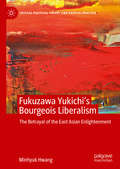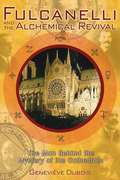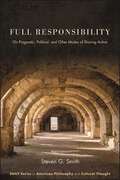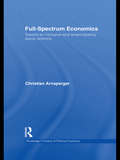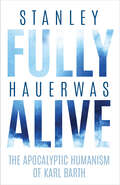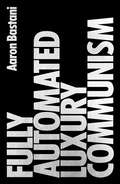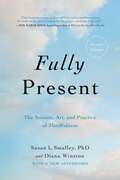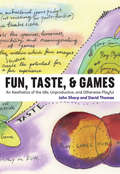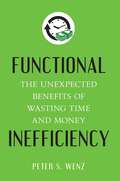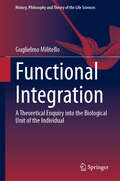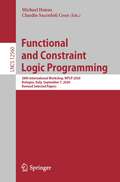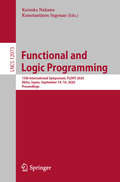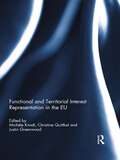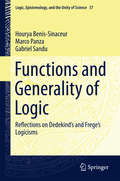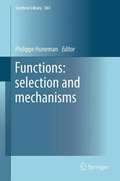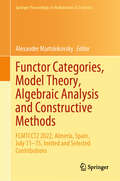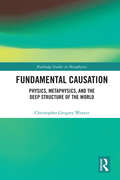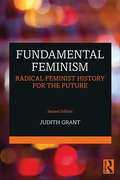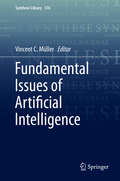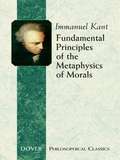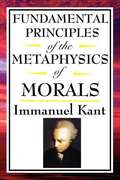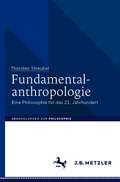- Table View
- List View
Fukuzawa Yukichi’s Bourgeois Liberalism: The Betrayal of the East Asian Enlightenment (Critical Political Theory and Radical Practice)
by Minhyuk HwangFukuzawa Yukichi’s Bourgeois Liberalism introduces readers to the East Asian Enlightenment led by Fukuzawa Yukichi, one of the most important figures in the intellectual history of modern Japan. Despite his impact on political theory and modern Japanese history, Fukuzawa remains under-researched in Western academia, and while a few English-language books have been written about Fukuzawa, none have dealt with his political theory. This book describes Fukuzawa as a character with universal relevance and a unique view of the Enlightenment tradition. Emphasizing the power of bourgeois liberalism and the debate regarding its potential for transforming the strict class-caste society of Tokugawa Japan, Hwang discusses Fukuzawa's belief in the significance of individual autonomy, progress, and liberal rule of law in developing his project of the East Asian enlightenment, as well as his supposed “betrayal” of his early commitments due to his existential desire for Western recognition of Japan’s greatness. The book ends with an analysis of the complex relation between liberalism and progress in the East Asian context.
Fulcanelli and the Alchemical Revival: The Man Behind the Mystery of the Cathedrals
by Geneviève DuboisSheds new light on the identity of the alchemist Fulcanelli• Provides new understanding of the relationships between the most important figures of the esoteric milieu of Paris in the first half of the 20th century• Includes a wealth of rarely seen documents, photos, and lettersFulcanelli, operative alchemist and author of The Mystery of the Cathedrals and The Dwellings of the Philosophers--two of the most important esoteric works of the twentieth century--remains himself a mystery. The true identity of the man who allegedly succeeded in creating the philosopher’s stone has never been discovered, despite ardent searches by many--even the OSS (the wartime U.S. intelligence agency, later to become the CIA) claimed to have looked for him following the end of World War II. Geneviève Dubois looks at the esoteric milieu of Paris at the turn of the century, a time that witnessed a great revival of the alchemical tradition, and investigates some of its salient personalities. Could one of these have been this enigmatic man, reported to have last appeared in Seville, Spain, in 1952 when he would have been 113 years of age?The trail followed by the author encounters such figures as Papus, René Guénon, Schwaller de Lubicz, Pierre Dujols, Eugene Canseliet, and Jean-Julien Champagne. Working from rare documents, letters, and photos, Dubois suggests that one of these men could have been hiding his activity behind the pseudonym of Fulcanelli or that Fulcanelli may even have been a composite fabricated by several of these individuals working together. Beyond its attempt to reveal the actual identity of Fulcanelli, Fulcanelli and the Alchemical Revival also presents an explanation of the alchemical doctrine and reveals the unsuspected relationships among the important twentieth-century truth seekers it highlights.
Full Responsibility: On Pragmatic, Political, and Other Modes of Sharing Action (SUNY series in American Philosophy and Cultural Thought)
by Steven G. SmithStarting with an appreciation of the practical realizations that move us to assume responsibility, Full Responsibility develops an ontologically-grounded model of different forms of responsibility and the challenges and fulfillments found in each. Special attention is given to pragmatic and political responsibility, highlighting considerations for right action that are not accurately recognized by universalizing ethics. Issues in abortion decisions, providing for responsible work, and immigration and refugee policy are examined in the complex frame of political responsibility. Moving past the standoff between political moralism and political realism, Steven G. Smith offers an account of political responsibility as an unstable combination of all modes of responsibility. The book concludes by reviewing different approaches to the impossible but compelling ideal of full responsibility. The distinctive natures of ethical, historical, and religious forms of responsibility are discussed in appendices.
Full-Spectrum Economics: Toward an Inclusive and Emancipatory Social Science (Routledge Frontiers Of Political Economy Ser.)
by Christian ArnspergerEconomics is essential in today’s world, and yet mainstream economists are increasingly under criticism for not taking into account sufficiently many dimensions of real life, such as political and moral values, human development, spirituality, and people’s widely shared aspiration to live more liberated lives. This book offers a critical assessment of contemporary mainstream economics by showing that the discipline has become much too narrow and misses out on the full spectrum of human existence. The book presents a careful, detailed analysis of the limitations of neoclassical economics and of its post-neoclassical successors: behavioral economics, neuroeconomics, and experimental economics. It offers a deconstruction rooted in the "Integral" philosophy developed over the past three decades by the contemporary American thinker Ken Wilber. Distinguishing between exterior and interior dimensions of human existence, it suggests that economics could be made into a more inclusive and more emancipatory science if it started to truly honor the genuinely interior aspects of individuals and communities. Instead of remaining stuck in the limitations of post-neoclassical theory, we should make the move toward a new paradigm that, in the name of science, promotes objectivity as well as subjectivity, and material causality as well as existential awareness. The result is a highly expanded sense of relevance for economists, sociologists, and social scientists in general. Combining methodologies from systems science, brain science, ethno-methodology, and existentialism as well as from the great spiritual traditions of humanity, Christian Arnsperger delineates the requirements of a genuinely integral economics beyond today’s crippling reductionism.
Fully Alive: The Apocalyptic Humanism of Karl Barth (Richard E. Myers Lectures)
by Stanley HauerwasLiving through an apocalyptic time, Swiss theologian Karl Barth influenced Christianity in the twentieth century profoundly. He publicly rejected Hitler’s Nazism, advocated on behalf of workers and laborers, and ministered to prisoners. Barth was named by Pope Pius XII as "the greatest theologian since Thomas Aquinas" and in 1962 even appeared on the cover of Time magazine. In Fully Alive, one of America’s best and most provocative theologians, Stanley Hauerwas, demonstrates that Barth’s radical theological perspective is particularly relevant and applicable to the challenges of our own time.Hauerwas argues that Barth’s engagements with the social and political struggles of his day can help us see what it means to be fully human in the twenty-first century. The ecclesiastical and the political were inseparable for Barth; similarly, Hauerwas shows why it is crucial for theological claims to produce insights that make it possible for our lives to be well lived. Including chapters on race, disability, and the church in Asia, Hauerwas shows how Barth’s political theology can be read as a training manual that can help us maintain our humanity in a world in crisis.
Fully Automated Luxury Communism
by Aaron BastaniA different kind of politics for a new kind of society--beyond work, scarcity and capitalismIn the twenty-first century, new technologies should liberate us from work. Automation, rather than undermining an economy built on full employment, is instead the path to a world of liberty, luxury and happiness—for everyone. Technological advance will reduce the value of commodities—food, healthcare and housing—towards zero. Improvements in renewable energies will make fossil fuels a thing of the past. Asteroids will be mined for essential minerals. Genetic editing and synthetic biology will prolong life, virtually eliminate disease and provide meat without animals. New horizons beckon. In Fully Automated Luxury Communism, Aaron Bastani conjures a vision of extraordinary hope, showing how we move to energy abundance, feed a world of 9 billion, overcome work, transcend the limits of biology, and establish meaningful freedom for everyone. Rather than a final destination, such a society merely heralds the real beginning of history.
Fully Present: The Science, Art, and Practice of Mindfulness
by Susan L. Smalley Diana Winston&“Excellent. Fully Present offers one of the clearest introductions to mindfulness in the field.&” —Library Journal Mindfulness has attracted ever‑growing interest and tens of thousands of practitioners, who have come to the discipline from both within and outside the Buddhist tradition. In Fully Present, leading mindfulness researchers and educators Dr. Sue Smalley and Diana Winston provide an all‑in‑one guide for anyone interested in bringing mindfulness to daily life as a means of enhancing well‑being. This new edition, how with a new afterword, provides both a scientific explanation for how mindfulness positively and powerfully affects the brain and the body as well as practical guidance to develop both a practice and mindfulness in daily living, not only through meditation but also during daily experiences. Now, you can wait in line at the supermarket, exercise, or face difficult news with calm and mental fortitude. Ditch the absent-minded lifestyle and begin bringing your full self and your full mind everywhere. With research studies, personal accounts, and practical applications, Fully Present highlights how things like simply breathing, listening, and walking can change your perspective--and your life.
Fun, Taste, & Games: An Aesthetics of the Idle, Unproductive, and Otherwise Playful (Playful Thinking)
by John Sharp David ThomasReclaiming fun as a meaningful concept for understanding games and play.“Fun” is somewhat ambiguous. If something is fun, is it pleasant? Entertaining? Silly? A way to trick students into learning? Fun also has baggage—it seems inconsequential, embarrassing, child's play. In Fun, Taste, & Games, John Sharp and David Thomas reclaim fun as a productive and meaningful tool for understanding and appreciating play and games. They position fun at the heart of the aesthetics of games. As beauty was to art, they argue, fun is to play and games—the aesthetic goal that we measure our experiences and interpretations against. Sharp and Thomas use this fun-centered aesthetic framework to explore a range of games and game issues—from workplace bingo to Meow Wolf, from basketball to Myst, from the consumer marketplace to Marcel Duchamp. They begin by outlining three elements for understanding the drive, creation, and experience of fun: set-outsideness, ludic forms, and ambiguity. Moving from theory to practice and back again, they explore the complicated relationships among the titular fun, taste, and games. They consider, among other things, the dismissal of fun by game journalists and designers; the seminal but underinfluential game Myst, and how tastes change over time; the shattering of the gamer community in Gamergate; and an aesthetics of play that goes beyond games.
Functional Inefficiency: The Unexpected Benefits of Wasting Time and Money
by Peter S. WenzHow can we reduce unemployment? As this insightful and counterintuitive book shows, the surprising answer is inefficiency. Some of the most labor-intensive sectors of the economy, the author notes, are also the most inefficient. But this inefficiency is functional-rather than impairing the economy, it bolsters employment and fosters economic growth. Technological progress increases efficiency and reduces the need for workers in manufacturing, mining, agriculture, and many services. So how do we keep people working? By maintaining inefficiencies in other areas, such as in our systems of transportation and healthcare. The author documents the waste of time and money in hospital systems, the insurance and pharmaceutical industries, automotive travel, and road construction and maintenance. These inefficiencies are tolerated because they provide a lot of jobs and promote economic growth, making them functional inefficiencies. Some of these inefficient systems come with added environmental and health costs, meaning we sacrifice more than simple efficiency for the sake of jobs. Our inefficiencies may be functional, argues Peter Wenz, but they are too often harmful for us as well. The good news is that most of these inefficiencies can be reduced without increasing unemployment or impairing economic growth. Wenz explores different methods of combating unemployment, evaluating each method carefully to determine its basic efficiencies and inefficiencies, as well as its impact on human wellbeing and on the environment. He also assesses whether it is culturally and politically acceptable and actually serves to reduce unemployment. Some inefficiency will remain, he concludes, but its negative impacts can be lessened through increased investment in physical and human infrastructure. Functional Inefficiencyoffers a wealth of details and a unique analysis of our economic system, plus hope for our future prospects through reduced inefficiency.
Functional Integration: A Theoretical Enquiry into the Biological Unit of the Individual (History, Philosophy and Theory of the Life Sciences #38)
by Guglielmo MilitelloThis book explores the main biological dimensions underlying functional integration and examines how they contribute to defining a biological individual as both a physiological and evolutionary unit. Functional integration lies at the heart of most definitions of both organisms and biological individuals, making it explanatorily relevant to biology as well as to the philosophy of biology. However, the notion—typically referring to any causal interdependence among biological functions—remains broad and lacks a coherent theoretical framework. This work addresses that gap by focusing on functional integration at the cellular level, which presents both a minimal degree of complexity (relative to multicellular organisms) and maximal conceptual significance for this inquiry. By analysing the transition from prokaryotes to eukaryotes, the book sheds light on how spatial constraints, system-level regulatory mechanisms, spatio-temporal coordination, and system-level reproduction contribute to characterizing biological organization as a functionally integrated physiological unit. This study opens the way for a fresh reflection on the foundations of biological individuality, offering insights not only for researchers, but also for students and non-specialist readers.
Functional and Constraint Logic Programming: 28th International Workshop, WFLP 2020, Bologna, Italy, September 7, 2020, Revised Selected Papers (Lecture Notes in Computer Science #12560)
by Michael Hanus Claudio Sacerdoti CoenThis book constitutes the refereed post-conference proceedings of the 28th International Workshop on Functional and Constraint Logic Programming, WFLP 2020, held in Bologna, Italy, in September 2020.Due to the COVID-19, the workshop was held online. From the 19 full papers submitted, 8 were accepted for presentation at the workshop. The accepted papers cover different programming areas of functional and logic programming, including code generation, verification, and debugging.
Functional and Logic Programming: 15th International Symposium, FLOPS 2020, Akita, Japan, September 14–16, 2020, Proceedings (Lecture Notes in Computer Science #12073)
by Keisuke Nakano Konstantinos SagonasThis book constitutes the proceedings of the 15th International Symposium on Functional and Logic Programming, FLOPS 2020, held in Akita, Japan*, in September 2020. The 12 papers presented in this volume were carefully reviewed and selected from 25 submissions. They cover all aspects of the design, semantics, theory, applications, implementations, and teaching of declarative programming focusing on topics such as functional programming, logic programming, declarative programming, constraint programming, formal method, model checking, program transformation, program refinement, and type theory. *The conference was held virtually due to the COVID-19 pandemic.
Functional and Territorial Interest Representation in the EU (Journal Of European Integration Special Issues Ser.)
by Justin Greenwood Christine Quittkat MichDespite a substantial legacy of literature on EU interest representation, there is no systematic analysis available on whether a European model of interest representation in EU governance is detectable across functional, and territorial, categories of actors. ‘Functional’ actors include associations for business interests, the professions, and trade unions, as well as ‘NGOs’ and social movements; territorial based entities include public actors (such as regional and local government), as well as actors primarily organised at territorial level. What are the similarities and differences between territorial, and functional, based entities, and are the similarities greater than the differences? Are the differences sufficient to justify the use of different analytical tools? Are the differences within these categories more significant than those across them? Is there a ‘professionalised European lobbying class’ across all actor types? Does national embeddedness make a difference? Which factors explain the success of actors to participate in European governance? This book was originally published as special issue of Journal of European Integration.
Functions and Generality of Logic
by Hourya Benis-Sinaceur Marco Panza Gabriel SanduThis book examines three connected aspects of Frege's logicism: the differences between Dedekind's and Frege's interpretation of the term 'logic' and related terms and reflects on Frege's notion of function, comparing its understanding and the role it played in Frege's and Lagrange's foundational programs. It concludes with an examination of the notion of arbitrary function, taking into account Frege's, Ramsey's and Russell's view on the subject. Composed of three chapters, this book sheds light on important aspects of Dedekind's and Frege's logicisms. The first chapter explains how, although he shares Frege's aim at substituting logical standards of rigor to intuitive imports from spatio-temporal experience into the deductive presentation of arithmetic, Dedekind had a different goal and used or invented different tools. The chapter highlights basic dissimilarities between Dedekind's and Frege's actual ways of doing and thinking. The second chapter reflects on Frege's notion of a function, in comparison with the notions endorsed by Lagrange and the followers of the program of arithmetization of analysis. It remarks that the foundational programs pursued by Lagrange and Frege are crucially different and based on a different idea of what the foundations of mathematics should be like. However, despite this contrast, the notion of function plays similar roles in the two programs, and this chapter emphasizes the similarities. The third chapter traces the development of thinking about Frege's program in the foundations of mathematics, and includes comparisons of Frege's, Russell's and Ramsey's views. The chapter discusses earlier papers written by Hintikka, Sandu, Demopoulos and Trueman. Although the chapter's main focus is on the notion of arbitrary correlation, it starts out by discussing some aspects of the connection between this notion and Dedekind Theorem.
Functions: From Organisms to Artefacts (History, Philosophy and Theory of the Life Sciences #32)
by Jean Gayon Armand De Ricqlès Antoine C. DussaultThis book, originally published in French, examines the philosophical debates on functions over the last forty years and proposes new ways of analysis. Pervasive throughout the life sciences, the concept of function has the air of an epistemological scandal: ascribing a function to a biological structure or process amounts to suggesting that it is explained by its effects. This book confronts the debates on function with the use of the notion in a wide range of disciplines, such as biology, psychology, and medicine. It also raises the question of whether this notion, which is as old in the history of technology as it is in the life sciences, has the same meaning in these two domains.
Functions: selection and mechanisms
by Philippe HunemanThis volume handles in various perspectives the concept of function and the nature of functional explanations, topics much discussed since two major and conflicting accounts have been raised by Larry Wright and Robert Cummins' papers in the 1970s. Here, both Wright's 'etiological theory of functions' and Cummins' 'systemic' conception of functions are refined and elaborated in the light of current scientific practice, with papers showing how the 'etiological' theory faces several objections and may in reply be revisited, while its counterpart became ever more sophisticated, as researchers discovered fresh applications for it. Relying on a firm knowledge of the original positions and debates, this volume presents cutting-edge research evincing the complexities that today pertain in function theory in various sciences. Alongside original papers from authors central to the controversy, work by emerging researchers taking novel perspectives will add to the potential avenues to be followed in the future. Not only does the book adopt no a priori assumptions about the scope of functional explanations, it also incorporates material from several very different scientific domains, e.g. neurosciences, ecology, or technology. In general, functions are implemented in mechanisms; and functional explanations in biology have often an essential relation with natural selection. These two basic claims set the stage for this book's coverage of investigations concerning both 'functional' explanations, and the 'metaphysics' of functions. It casts new light on these claims, by testing them through their confrontation with scientific developments in biology, psychology, and recent developments concerning the metaphysics of realization. Rather than debating a single theory of functions, this book presents the richness of philosophical issues raised by functional discourse throughout the various sciences.
Functions: selection and mechanisms (Synthese Library #363)
by Philippe HunemanThis volume handles in various perspectives the concept of function and the nature of functional explanations, topics much discussed since two major and conflicting accounts have been raised by Larry Wright and Robert Cummins’ papers in the 1970s. Here, both Wright’s ‘etiological theory of functions’ and Cummins’ ‘systemic’ conception of functions are refined and elaborated in the light of current scientific practice, with papers showing how the ‘etiological’ theory faces several objections and may in reply be revisited, while its counterpart became ever more sophisticated, as researchers discovered fresh applications for it. Relying on a firm knowledge of the original positions and debates, this volume presents cutting-edge research evincing the complexities that today pertain in function theory in various sciences. Alongside original papers from authors central to the controversy, work by emerging researchers taking novel perspectives will add to the potential avenues to be followed in the future. Not only does the book adopt no a priori assumptions about the scope of functional explanations, it also incorporates material from several very different scientific domains, e.g. neurosciences, ecology, or technology. In general, functions are implemented in mechanisms; and functional explanations in biology have often an essential relation with natural selection. These two basic claims set the stage for this book’s coverage of investigations concerning both ‘functional’ explanations, and the ‘metaphysics’ of functions. It casts new light on these claims, by testing them through their confrontation with scientific developments in biology, psychology, and recent developments concerning the metaphysics of realization. Rather than debating a single theory of functions, this book presents the richness of philosophical issues raised by functional discourse throughout the various sciences.
Functor Categories, Model Theory, Algebraic Analysis and Constructive Methods: FCMTCCT2 2022, Almería, Spain, July 11–15, Invited and Selected Contributions (Springer Proceedings in Mathematics & Statistics #450)
by Alexander MartsinkovskyThis volume comprises selected contributions by the participants of the second "Functor Categories, Model Theory, Algebraic Analysis and Constructive Methods" conference, which took place at the University of Almería, Spain, in July 2022.The conference was devoted to several seemingly unrelated fields: functor categories, model theory of modules, algebraic analysis (including linear control systems), and constructive category theory, to mention just a few. The fact that these fields are actually related is a very recent realization. The connections between these disciplines are changing in real time, and the goal of this volume is to provide an initial reference point for this emerging interdisciplinary field.Besides research articles, the volume includes two extended lectures: one on constructive methods in algebraic analysis and the other on the functorial approach to algebraic systems theory. Hence, in addition to its interestfor researchers, the volume will also be an invaluable resource for newcomers.
Fundamental Causation: Physics, Metaphysics, and the Deep Structure of the World (Routledge Studies in Metaphysics)
by Christopher Gregory WeaverFundamental Causation addresses issues in the metaphysics of deterministic singular causation, the metaphysics of events, property instances, facts, preventions, and omissions, as well as the debate between causal reductionists and causal anti-reductionists. The book also pays special attention to causation and causal structure in physics. Weaver argues that causation is a multigrade obtaining relation that is transitive, irreflexive, and asymmetric. When causation is singular, deterministic and such that it relates purely contingent events, the relation is also universal, intrinsic, and well-founded. He shows that proper causal relata are events understood as states of substances at ontological indices. He then proves that causation cannot be reduced to some non-causal base, and that the best account of that relation should be unashamedly primitivist about the dependence relation that underwrites its very nature. The book demonstrates a distinctive realist and anti-reductionist account of causation by detailing precisely how the account outperforms reductionist and competing anti-reductionist accounts in that it handles all of the difficult cases while overcoming all of the general objections to anti-reductionism upon which other anti-reductionist accounts falter. This book offers an original and interesting view of causation and will appeal to scholars and advanced students in the areas of metaphysics, philosophy of science, and philosophy of physics.
Fundamental Feminism: Radical Feminist History for the Future
by Judith GrantIn this updated classic, Judith Grant provides a new introduction and postscript that frames her original work as part of a larger argument about the importance of structuralism in radical feminist ideas of patriarchy. Forewords by esteemed feminist theorists reintroduce the new edition to the latest generation of feminist students and scholars. In Fundamental Feminism, Judith Grant explores the evolution of feminist theory in the context of today's feminist thought. In the original work, Grant analzyed three core concepts in feminist theory – "woman," "experience," and "personal politics" – from their origins in pamphlets and writings from the early women's liberation movement to their later constructions in feminist thought. In this second edition, she argues for the pivotal role of early radical feminism and the longstanding influence of these core assumptions on current theories including intersectional theory, queer theory structuralism and poststructuralism, and ongoing discussions about the sexuality debates of the 1980s. Fundamental Feminism is provocative reading for anyone interested in the history and future of feminist theory and the power of feminist politics.
Fundamental Issues of Artificial Intelligence (Synthese Library #376)
by Vincent C. MüllerThis volume offers a look at the fundamental issues of present and future AI, especially from cognitive science, computer science, neuroscience and philosophy. This work examines the conditions for artificial intelligence, how these relate to the conditions for intelligence in humans and other natural agents, as well as ethical and societal problems that artificial intelligence raises or will raise. The key issues this volume investigates include the relation of AI and cognitive science, ethics of AI and robotics, brain emulation and simulation, hybrid systems and cyborgs, intelligence and intelligence testing, interactive systems, multi-agent systems, and super intelligence. Based on the 2nd conference on “Theory and Philosophy of Artificial Intelligence” held in Oxford, the volume includes prominent researchers within the field from around the world.
Fundamental Principles of the Metaphysics of Morals
by Immanuel KantWhat is morally permissible, and what is morally obligatory? These questions form the core of a vast amount of philosophical reasoning. In his Fundamental Principles of the Metaphysics of Morals, Immanuel Kant developed a basis for the answers.In this landmark work, the German philosopher asks what sort of maxim might function as a guide to appropriate action under a given set of circumstances. By universalizing such a maxim, would morally permissible behavior not become clear? Suppose that everyone were to behave in accordance with this maxim. If everyone followed the maxim in the same way without harm to civilized culture, then the behavior would be morally permissible. But what if no one followed the maxim? Would civilization thereby be at risk? In such a case, the behavior would be morally obligatory.Kant's test, known as the Categorical Imperative, is a logical proof of the Golden Rule and the centerpiece of this work. It constitutes his best-known contribution to ethical discussion, and a familiarity with his reasoning in this book is essential to students of philosophy, religion, and history.
Fundamental Principles of the Metaphysics of Morals
by Immanuel KantKant's Fundamental Principles of the Metaphysics of Morals is one of the most important works in modern moral philosophy. It belongs beside Plato, Aristotle, Machiavelli, and Hobbes. Here Kant sets out to articulate and defend the Categorical Imperative-- the fundamental principle that underlies moral reasoning-- and to lay the foundation for a comprehensive account of justice and human virtues.
Fundamental Uncertainty
by Roberto Scazzieri Silva Marzetti Dall’Aste BrandoliniThis volume addresses the subject of uncertainty from the point of view of an extended conception of rationality. In particular, the contributions explore the premises and implications of plausible reasoning when probabilities are non-measurable or unknown, and when the space of possible events is only partially identified.
Fundamentalanthropologie: Eine Philosophie für das 21. Jahrhundert (Abhandlungen zur Philosophie)
by Thorsten StreubelDie Frage nach dem Menschen ist heute – im Zeitalter der zunehmenden Verschmelzung von Mensch und Technik (Cyborgisierung), der Genom-Editierung und der fortgeschrittenen Naturalisierung des Menschenbildes – aktueller denn je. Der Autor präsentiert hier erstmals eine systematische und prägnante Darstellung der Idee einer neuen Anthropologie, welche die mundanen, transzendentalen und transphänomenalen Aspekte des Menschseins gleichermaßen berücksichtigt und die Reduktion des Menschen auf seinen biologischen Körper zurückweist. Diese ‚Fundamentalanthropologie‘ genannte Disziplin versteht sich als philosophische Grundlagendisziplin und als Herzstück der Philosophie als allgemeiner Anthropologie. Außerdem werden in diesem Band zentrale und aktuelle philosophische Themen wie Selbstbewusstsein, Identität des Ich, das Wesen des menschlichen Geistes sowie die Zukunft des Menschen erstmals zum Gegenstand fundamentalanthropologischer Analysen gemacht.
